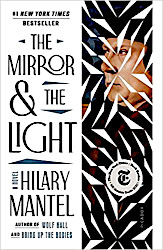I would admit right away that I struggled to finish “The Mirror And The Light” by Hilary Mantel, the last book in the “Wolf Hall” trilogy based on the life of Thomas Cromwell. I had immensely enjoyed the first book and had also liked the second book, so this is a little painful to admit.
“Even more of the same” would be an appropriate description for this book and I do mean that in the sense of it being repetitive and thus tedious. A wiser person would have abandoned this book long before the approximately two months that I wrested with this book, but then I have seldom acted wisely when it comes to “finding closure” in reading books, watching long-winded TV-series, etc. So I finally managed to finish reading through the more than 750 pages of this book, but I am not too happy about it.
There is only so much that you can read about the inner monologue of a person, the craziness of medieval England, the inane machinations of the Tudor royal court, etc. The first two books gave you a pretty good idea of these things, so this book could have been slashed by at least two-thirds of its current length without loss. So I do not agree with all the starry-eyed reviewers praising this book due to its pedigree and with star-struck editors who shirked from their job in cutting out the fluff. Sorry.
The pacing of the book is quite irregular – for a large part of the book, pretty much nothing interesting happens, making it hard to remain attentive, and then towards the end things happen rather haphazardly and the book ends somewhat abruptly. Some good editing would have done wonders for this book. All the silly verse interrupting the prose at odd intervals throughout the book do not help matters much either.
The book is not entirely boring though. As before, there are flashes of genius in the writing, which retains the accessible linguistic style employed by the author throughout the trilogy. The author continues to excel in making history interesting and in making historical characters come alive for the modern reader. In particular, I really admire the author for not succumbing to using archaic English, peppering the text with untranslated French or Latin, or employing a pretentious writing-style – all characteristics that ail so many works of “serious literature”.
If you have read the first two books in the trilogy, you would probably want to read the final book in the trilogy as well. However, be warned. I found my closure all right, but in the process ruined my appreciation for the entire trilogy. For shame.
